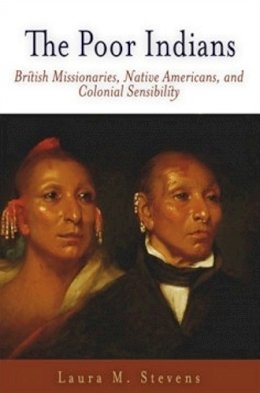
Stock image for illustration purposes only - book cover, edition or condition may vary.
The Poor Indians: British Missionaries, Native Americans, and Colonial Sensibility
Laura M. Stevens
€ 40.97
FREE Delivery in Ireland
Description for The Poor Indians: British Missionaries, Native Americans, and Colonial Sensibility
Paperback. Missionary work, arising from a sense of pity, helped convince the British that they were a benevolent people. Stevens relates this to the rise of the cult of sensibility, when philosophers argued that humans were inherently good because they felt sorrow at the sign of suffering. Series: Early American Studies. Num Pages: 272 pages, 5 illus. BIC Classification: 1K; GTB; HBJK; HBLH; JFSL9. Category: (U) Tertiary Education (US: College). Dimension: 229 x 152 x 15. Weight in Grams: 406.
Between the English Civil War of 1642 and the American Revolution, countless British missionaries announced their intention to "spread the gospel" among the native North American population. Despite the scope of their endeavors, they converted only a handful of American Indians to Christianity. Their attempts to secure moral and financial support at home proved much more successful.
In The Poor Indians, Laura Stevens delves deeply into the language and ideology British missionaries used to gain support, and she examines their wider cultural significance. Invoking pity and compassion for "the poor Indian"—a purely fictional construct—British missionaries used the Black Legend ... Read more
Product Details
Publisher
University of Pennsylvania Press United States
Number of pages
272
Format
Paperback
Publication date
2006
Series
Early American Studies
Condition
New
Number of Pages
272
Place of Publication
Pennsylvania, United States
ISBN
9780812219678
SKU
V9780812219678
Shipping Time
Usually ships in 7 to 11 working days
Ref
99-1
About Laura M. Stevens
Laura M. Stevens teaches English at the University of Tulsa.
Reviews for The Poor Indians: British Missionaries, Native Americans, and Colonial Sensibility
"Stevens has written a thoughtful study of British missionary culture. Most important, she reveals how philanthropy shaped the identity of a transatlantic British public and the ways that identity has resonated from the seventeenth century all the way up to our time."
New England Quarterly
"Eloquent and important. . . . This is a work of careful textual ... Read more
New England Quarterly
"Eloquent and important. . . . This is a work of careful textual ... Read more
